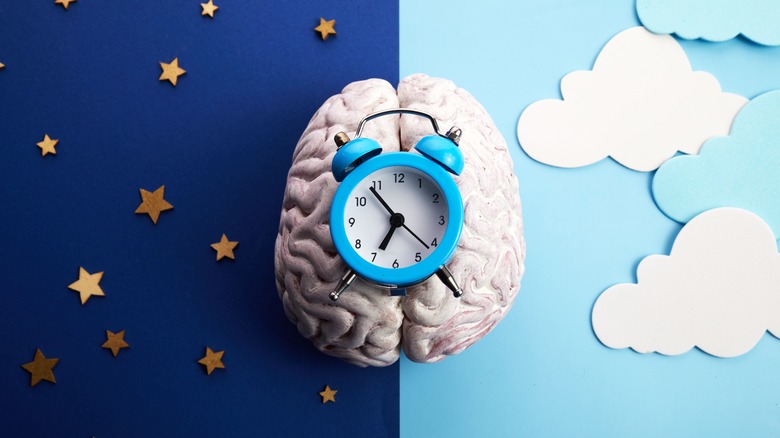What Syncing Your Circadian Rhythm Can Do For Your Body
If the human body had a personality type, it would definitely be type A. By that, we mean it keeps a rather strict and organized schedule. Just like the person who needs everything planned to a tee, when the body's routine gets out of whack, it can get pretty flustered.
If the body is happy and healthy, each biological process and function is carried out within a consistent time frame from day to day, says Verywell Mind. This biological timekeeping is known as the circadian rhythm. It is responsible for maintaining everything from your sleeping cycle to the hormones in your body, so keeping it on track is essential for feeling good on a day-to-day basis.
We all have a natural rhythm that our body feels its best in. However, Cleveland Clinic notes that our biological processes can get out of sync for various reasons. The source says that blue light exposure, late nights out, caffeine, and more can all disrupt your circadian rhythm.
Why your circadian rhythm is important
The modern lifestyle is brimming with stimulants and distractions that can throw your circadian rhythm out of sync. Staying indoors all day, scrolling on social media into the night, and sleeping in on the weekends are just a few issues that WebMD notes as schedule-ruining risks. And if, like many of us, you're guilty of these habits, WebMD cautions that an out-of-sync circadian rhythm can contribute to serious, longer-term issues like obesity, diabetes, and depression. Keeping your eating, exercise, and sleep moderately regimented is essential to maintaining your mental and physical health, reports Bustle.
Not only can it help you feel your best, but it can help you to better understand yourself. Psychologist Alicia Roth, Ph.D., tells Cleveland Clinic, "It's also ideal to be aware of your circadian rhythm because it also dictates when you're going to be most alert during the day and when you're going to be the most productive." When you're in tune with your energy peaks and dips, you can plan your day to optimize your performance and happiness.
How to get your circadian rhythm in sync
You can do many things to get your circadian rhythm in sync. However, WebMD notes that everyone's natural sleep pattern is different. This means that the timing for one person might not work for the other. So, note your tendencies. Do you get tired in the afternoon? Do you have more energy in the morning or the evening? These are questions you should ask yourself before setting your daily habits. However, whatever your natural proclivity, WebMD suggests that you start your nighttime routine and morning routine within the same 30 minutes every day.
While some schedule choices can be more personalized, there are some general guidelines that ensure your bodily processes run smoothly. According to Chopra, exposure to a daily dose of sunshine once you wake up and throughout your day can help regulate your hormone production. Chopra also writes that limiting your blue light exposure at night can help you return to your natural timing. Try to either minimize your technology use or put on a pair of blue-light glasses once the sun sets. Cleveland Clinic also suggests you avoid alcohol, caffeine, and naps to get your body on its natural track.


